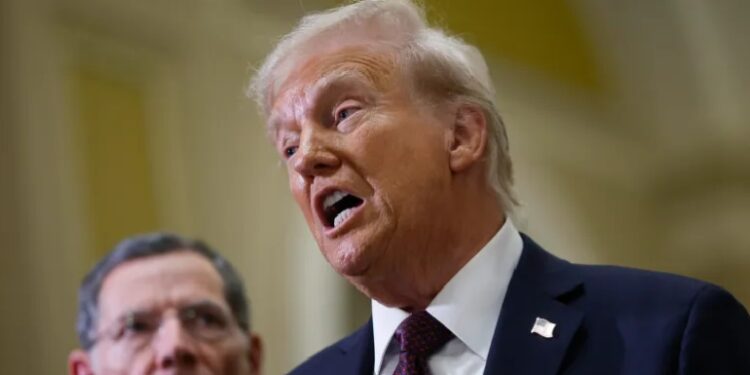By Enyichukwu Enemanna
US President-elect Donald Trump has been sentenced to an “unconditional discharge” following his conviction over hush money payments made to adult film actress Stormy Daniels in 2006, making him the first former US president in history to be sentenced for a crime.
Judge Juan Merchan delivered the decision on Friday after the US Supreme Court on Thursday rejected an attempt by Trump’s legal team to delay sentencing so that he could be inaugurated as the 47th President of the United States on Jan. 20.
An “unconditional discharge” implies that Trump’s conviction will appear on his permanent record, but it does not warrant imprisonment, a fine, or probation.
He will enter the White House ten days from the date of his sentencing as a convicted person.
Trump, who won the November 2024 presidential election against Democrat Vice President Kamala Harris, was found guilty last May on 34 counts of falsifying business documents related to hush money payments made to Stormy Daniels, among other things.
The real estate tycoon, who previously served as president from 2017 to 2021, denied any wrongdoing and said he plans to appeal his conviction.
Appearing at Friday’s sentencing hearing virtually, Trump said his criminal trial and conviction had “been a very terrible experience” and insisted he committed no crime.
“It’s been a political witch-hunt,” he said before the judge issued his decision. “It was done to damage my reputation so I would lose the election, and obviously, that didn’t work.”
Prosecutors in the New York case argued that the hush money payments aimed to conceal allegations of a sexual relationship with Daniels that could have been politically damaging in 2016, when Trump first ran and won as the 45th US president.
Trump, who pleaded not guilty, has denied any such relationship took place.
His lawyers had asked the Supreme Court for a stay of the sentencing “to prevent grave injustice and harm to the institution of the Presidency and the operations of the federal government”.
They argued that a ruling last year by the top court granting presidents broad immunity from criminal prosecution meant some of the evidence should not have been presented in the case.
However, a majority of the justices on the Supreme Court, while approving Trump’s sentencing on Thursday, said the “alleged evidentiary violations” at Trump’s state court trial “can be addressed in the ordinary course on appeal”.
They also said “the burden that sentencing will impose” on Trump’s responsibilities “is relatively insubstantial in light of the trial court’s stated intent to impose a sentence of ‘unconditional discharge’ after a brief virtual hearing”.
Under New York’s penal code, a court can sentence a defendant to unconditional discharge if it “is of the opinion that no proper purpose would be served by imposing any condition upon the defendant’s release”.




































